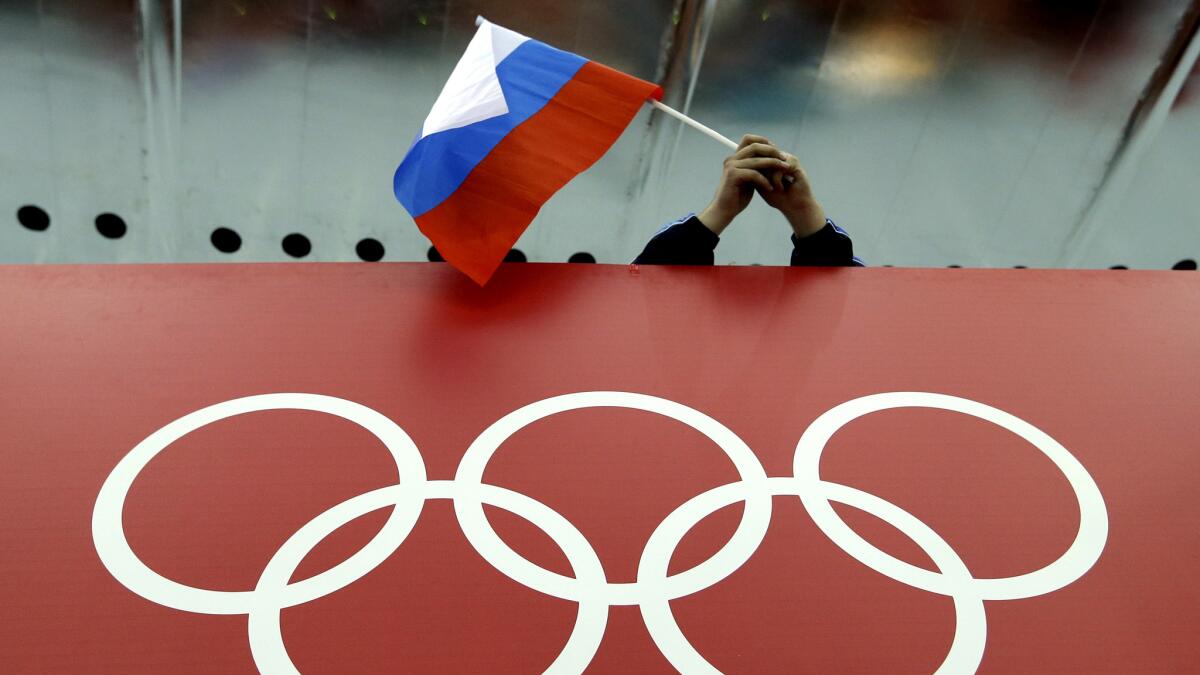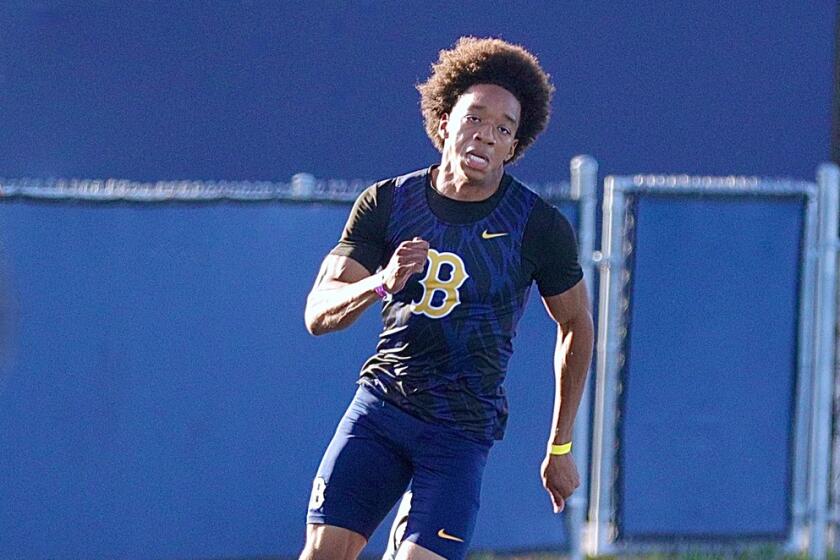Russian track athletes to learn their Olympic fate on Friday

- Share via
The sport of track and field faces a watershed moment Friday, one that will not take place inside a stadium or arena.
The sport’s leaders will gather at an Austrian hotel to discuss whether the powerhouse Russian track team should be allowed to compete at the 2016 Summer Olympics.
Their decision will not be easy.
The Russians were provisionally suspended last year after the World Anti-Doping Agency presented evidence of systemic cheating among the team’s athletes, coaches and officials.
In a time of rampant doping and corruption scandals, the IAAF — track’s governing body — faces public pressure to uphold the ban.
Russian officials insist they should be reinstated after enacting a series of reforms. They say excluding the entire track team would unfairly punish athletes who have not used performance-enhancing drugs.
On a wider scale, there are concerns about focusing on one country when so many others have come under scrutiny.
“The Olympic movement has not dealt with an issue of this magnitude before,” said Roger Pielke Jr., director of the Center for Sports Governance at the University of Colorado. “It’s horrifically messy and there’s just no good outcome, this week or this summer.”
In the months since WADA issued its findings — and the IAAF quickly responded with a suspension — the media have reported on additional doping allegations within Russian sport.
These findings have led to calls for excluding the entire Russian contingent from the Games in Rio de Janeiro in August.
In the past, the International Olympic Committee has taken such harsh action solely for geopolitical reasons. For example, South Africa was previously banned for refusing to condemn apartheid, and Afghanistan for discriminating against women under Taliban rule.
The 27 members of the IAAF Council convening at the Grand Hotel Wien will limit their discussion to one country and one sport. They are expected to render a decision after hearing from a five-member task force that has monitored reform measures in Russia.
Over the past seven months, sports officials within that nation have overhauled their track federation’s leadership, instituted additional drug testing and allowed international experts to observe the work of their anti-doping agency.
In a letter to Olympic leaders earlier this week, a group of Russian athletes pleaded for a chance to compete in Rio, writing: “Please let us know what else we need to do to assure the Olympic community in our commitment to the fight against doping.”
Much of the sporting world wants to see the IAAF take a hard-line stance.
“The time is now,” U.S. runner Alysia Montano said. “The whole world is aware of what’s going on.”
At ground level — on the track in Rio — excluding the Russians would have significant repercussions.
“If this was rhythmic gymnastics or water polo, it would be a far easier decision,” Pielke said. “But it’s track and field and it’s Russia, which is a giant.”
The Russians ranked ninth as a team at the world championships in Beijing last summer, winning medals in multiple events, including the men’s hurdles and women’s high jump.
“Russia’s absence from Rio would be a permanent reminder of an Olympic Games that would be broken,” Vitaly Mutko, the nation’s sports minister, wrote in a recent Times of London column. “It would also be poorer, not just for the lack of top athletes missing from its flagship events, but for missing the memories that our sportsmen and women could contribute.”
Mutko pointed out that his country is not the only one suspected of cheating.
Kenya, the top country at the recent world championships with 16 medals, was recently placed on a watch list for non-compliance with WADA drug-testing standards. Ethiopia, winner of eight medals, received a similar warning.
Both nations are currently set to participate in Rio.
Ten-time Olympic medalist Carl Lewis calls the situation “a hot mess.”
“It isn’t just a specific country,” he said. “It’s more of a systemic issue we should be focused on as opposed to just Russia.”
Olympic historian David Wallechinsky senses momentum building for a stern approach to nations violating or ignoring the WADA code.
“It’s their own fault,” said Wallechinsky, author of “The Complete Book of the Olympics.” “But, boy, that’s a lot of great athletes.”
There might be a compromise in the case before the IAAF Council. The Russian track team could remain suspended while its athletes — those who have not tested positive — compete in Rio as independents.
Regardless of which way council members vote Friday, they will undoubtedly face backlash.
If the suspension stands, some critics will deem it selective punishment. If it is lifted, others might see the anti-doping effort as hollow.
At the same time, the uproar could be short-lived.
If past Olympics are any indication, surrounding controversies tend to fade once the Games begin and everyone switches their focus to the field of play.
“When you actually get to the event, we’ve got all these narratives to pay attention to,” said Bill Smith, a sports governance expert at the University of Idaho. “Folks will be happy to watch.”
More to Read
Go beyond the scoreboard
Get the latest on L.A.'s teams in the daily Sports Report newsletter.
You may occasionally receive promotional content from the Los Angeles Times.











